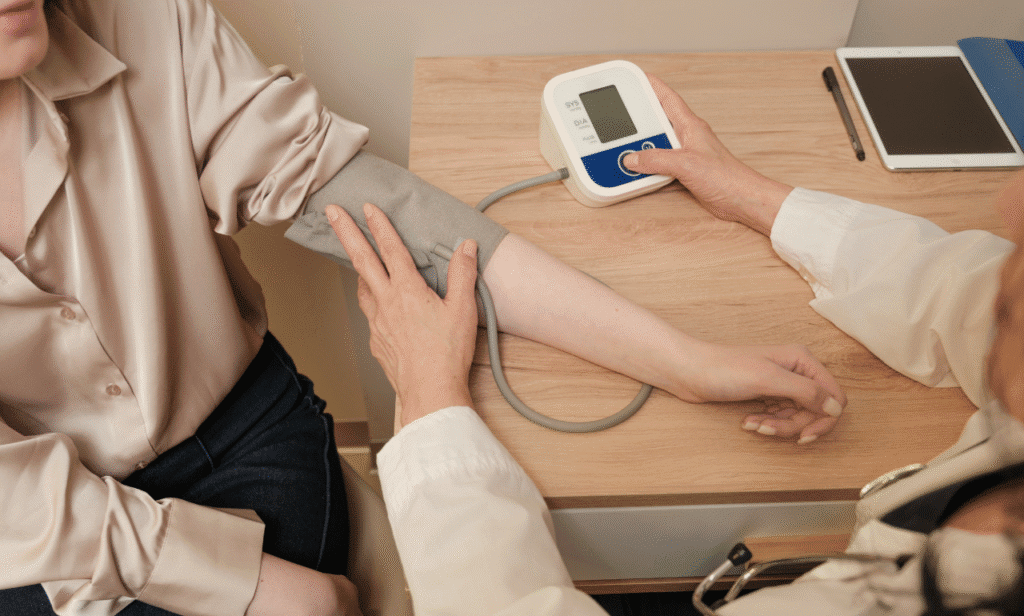
High blood pressure is one of the most common health conditions worldwide and a major risk factor for heart disease, stroke, and kidney problems. Understanding what causes high blood pressure, how to reduce high blood pressure, and the safest high blood pressure treatment options can help you protect your long-term health. This guide follows the EEAT framework—Expertise, Experience, Authoritativeness, and Trustworthiness—to provide evidence-based information that is easy to follow.
What Is High Blood Pressure?
High blood pressure, also known as hypertension, occurs when the force of blood pushing against the artery walls stays consistently higher than normal. Doctors usually define high blood pressure as 140/90 mmHg or above, but treatment may start earlier depending on risk factors.
When blood pressure remains too high for a long period, the heart must work harder to pump blood. This can damage blood vessels, weaken the heart, and affect other organs such as the kidneys, brain, and eyes.
What Causes High Blood Pressure?
Understanding what causes high blood pressure is essential for early prevention. Several proven factors can contribute:
1. Unhealthy Diet
A diet high in sodium, processed foods, sugar, and saturated fats increases the risk of high blood pressure. Low potassium intake also affects the body’s ability to balance sodium levels.
2. Lack of Physical Activity
Sedentary lifestyle causes stiffening of the arteries, weight gain, and poor heart function—all of which contribute to hypertension.
3. Obesity
Excess body weight forces the heart to work harder, raising blood pressure levels.
4. Genetics
Family history is one of the strongest predictors. If close relatives have hypertension, your risk is higher.
5. Stress
Chronic stress and poor stress-management habits trigger hormonal changes that raise blood pressure.
6. Alcohol and Smoking
Both alcohol and tobacco weaken blood vessel walls and increase blood pressure.
7. Medical Conditions
Diabetes, kidney disorders, thyroid diseases, and hormonal imbalances can also cause high blood pressure.
These key factors explain what causes high blood pressure and why lifestyle and medical care are equally important in managing the condition.
How to Reduce High Blood Pressure Naturally
If you want to know how to reduce high blood pressure, the good news is that simple lifestyle changes can make a big difference. Here are medically proven strategies:
1. Reduce Salt Intake
Limit sodium to 1500–2300 mg per day. Avoid packaged, fried, and fast foods.
2. Eat a Heart-Healthy Diet
Follow the DASH (Dietary Approaches to Stop Hypertension) diet, which includes:
- Fruits and vegetables
- Whole grains
- Lean proteins
- Low-fat dairy
- Nuts and seeds
3. Exercise Regularly
Aim for 30 minutes of aerobic exercise such as brisk walking, cycling, or swimming at least 5 days a week.
4. Maintain a Healthy Weight
Even losing 5–10% of your body weight can significantly reduce high blood pressure.
5. Manage Stress
Practice yoga, meditation, deep breathing, and mindfulness.
6. Limit Alcohol and Quit Smoking
Reducing alcohol and avoiding tobacco improves blood vessel health.
7. Sleep 7–9 Hours
Poor sleep quality affects hormones that regulate blood pressure.
These tips will help you understand how to reduce high blood pressure effectively and maintain long-term health.
High Blood Pressure Treatment Options
High blood pressure treatment usually involves a combination of lifestyle changes and medications prescribed by healthcare professionals.
1. Lifestyle Modification
Doctors always recommend lifestyle changes as the first step in high blood pressure treatment. This includes diet improvement, exercise, and stress control.
2. Medications
If lifestyle changes are not enough, the following medicines may be prescribed:
- Diuretics (help remove excess water and sodium)
- ACE Inhibitors (relax blood vessels)
- Beta-blockers (reduce heart workload)
- Calcium Channel Blockers (prevent artery tightening)
Always consult a doctor before starting or stopping any medication. Medicine choice depends on age, health condition, and risk factors.
3. Regular Monitoring
Monitoring blood pressure at home helps track improvement and detect early changes.
4. Treating Underlying Conditions
If conditions like diabetes or kidney disease are present, proper management is critical for effective high blood pressure treatment.
Frequently Asked Questions (FAQ)
1. What causes high blood pressure the most?
The leading causes include high sodium intake, obesity, lack of exercise, genetics, stress, and medical conditions such as diabetes.
2. How to reduce high blood pressure quickly?
Reduce salt, drink more water, take a short walk, practice deep breathing, and avoid caffeine. However, long-term control requires lifestyle changes.
3. Is high blood pressure treatment lifelong?
In many cases, yes. Some people can reduce medication with lifestyle improvement, but only a doctor can make that decision.
4. Can high blood pressure be cured permanently?
It cannot be “cured” but can be controlled effectively with lifestyle changes and proper treatment.
5. Which foods help reduce high blood pressure?
Leafy greens, bananas, oats, garlic, yoghurt, berries, flaxseeds, and beetroot are excellent for heart health.
